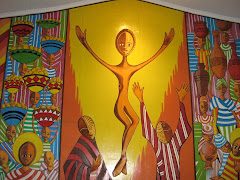Dear Friends
Eid Mubarak
May God bless the spiritual efforts of all who want to come closer to God and serve humanity. I would like to share with you the message of the Pontifical Council for Interreligious dialogue on the ocasion of Eid. PONTIFICAL COUNCIL FOR INTERRELIGIOUS DIALOGUE
Christians and Muslims:Together in overcoming poverty
MESSAGE FOR THE END OF RAMADAN ‘Id al-Fitr, 2009 a.d.
Vatican City
Dear Muslim Friends,
1. On the occasion of your feast which concludes the month of Ramadan, I would like to extend my best wishes for peace and joy to you and, through this Message, propose this theme for our reflection: Christians and Muslims: Together in overcoming poverty.
2. This Message of the Pontifical Council for Interreligious Dialogue has become a tradition cherished by us all, which is looked forward to each year and this is certainly a cause for joy. It has become, over the years, an occasion of cordial encounter in many countries between many Christians and Muslims. It often addresses a matter of shared concern, making it therefore conducive to a confident and open exchange. Are not all these elements immediately perceived as signs of friendship among us for which we should thank God?
3. Coming to the theme of this year, the human person in a situation of impoverishment is undoubtedly a subject at the heart of the precepts that, under different beliefs, we all hold dear. The attention, the compassion and the help that we, brothers and sisters in humanity, can offer to those who are poor, helping them to establish their place in the fabric of society, is a living proof of the Love of the Almighty, because it is man as such whom He calls us to love and help, without distinction of affiliation. We all know that poverty has the power to humiliate and to engender intolerable sufferings; it is often a source of isolation, anger, even hatred and the desire for revenge. It can provoke hostile actions using any available means, even seeking to justify them on religious grounds, or seizing another man’s wealth, together with his peace and security, in the name of an alleged “divine justice”. This is why confronting the phenomena of extremism and violence necessarily implies tackling poverty through the promotion of integral human development that Pope Paul VI defined as the “new name for peace” (Encyclical Letter Populorum Progressio, 1975, n. 76). In his recent Encyclical Letter Caritas in Veritate on integral human development in charity and truth, Pope Benedict XVI, taking into consideration the current context of efforts to promote development, underlines the need for a “new humanistic synthesis” (n. 21), which, safeguarding the openness of man to God, gives him his place as the earth’s “centre and summit” (n. 57). A true development, then, must be ordered “to the whole man and to every man” (Populorum Progressio, n. 42).
4. In his talk on the occasion of the World Day for Peace, 1st January 2009, His Holiness Pope Benedict XVI distinguished two types of poverty: a poverty to be combated and a poverty to be embraced. The poverty to be combated is before the eyes of everyone: hunger, lack of clean water, limited medical care and inadequate shelter, insufficient educational and cultural systems, illiteracy, not to mention also the existence of new forms of poverty “…in advanced wealthy societies, there is evidence of marginalization, as well as affective, moral and spiritual poverty…” (Message for the World Day of Peace, 2009, n. 2). The poverty to be embraced is that of a style of life which is simple and essential, avoiding waste and respecting the environment and the goodness of creation. This poverty can also be, at least at certain times during the year, that of frugality and fasting. It is the poverty which we choose which predisposes us to go beyond ourselves, expanding the heart.
5. As believers, the desire to work together for a just and durable solution to the scourge of poverty certainly also implies reflecting on the grave problems of our time and, when possible, sharing a common commitment to eradicate them. In this regard, the reference to the aspects of poverty linked to the phenomena of globalization of our societies has a spiritual and moral meaning, because all share the vocation to build one human family in which all - individuals, peoples and nations - conduct themselves according to the principles of fraternity and responsibility.
6. A careful study of the complex phenomenon of poverty directs us precisely towards its origin in the lack of respect for the innate dignity of the human person and calls us to a global solidarity, for example through the adoption of a “common ethical code” (John Paul II, Address to The Pontifical Academy of Social Sciences, 27 April 2001, n. 4) whose norms would not only have a conventional character, but also would necessarily be rooted in the natural law written by the Creator in the conscience of every human being (cf. Rom 2, 14-15).
7. It seems that in diverse places of the world we have passed from tolerance to a meeting together, beginning with common lived experience and real shared concerns. This is an important step forward. In giving everyone the riches of a life of prayer, fasting and charity of one towards the other, is it not possible for dialogue to draw on the living forces of those who are on the journey towards God? The poor question us, they challenge us, but above all they invite us to cooperate in a noble cause: overcoming poverty!
Happy ‘Id al-Fitr!
Jean-Louis Cardinal Tauran President Archbishop Pier Luigi Celata Secretary PONTIFICAL COUNCIL FOR INTERRELIGIOUS DIALOGUE00120 Vatican City
''''''''''''''''''''''''''''''''''''''
COURTESY: Victor Edwin SJ
Manresa House,
Birmingham
United Kingdom
--------------------








